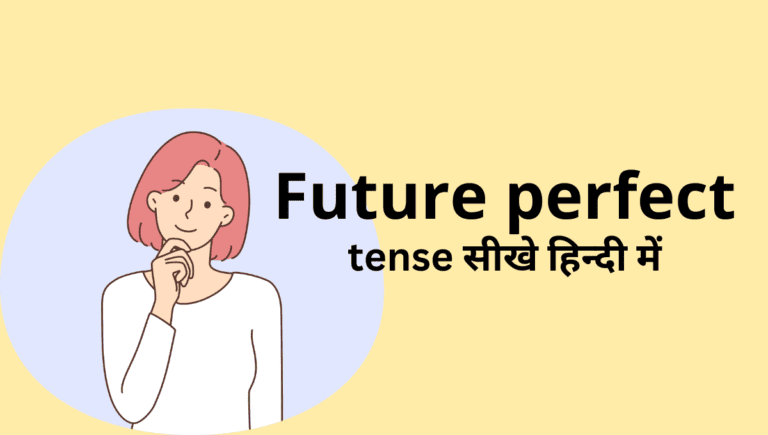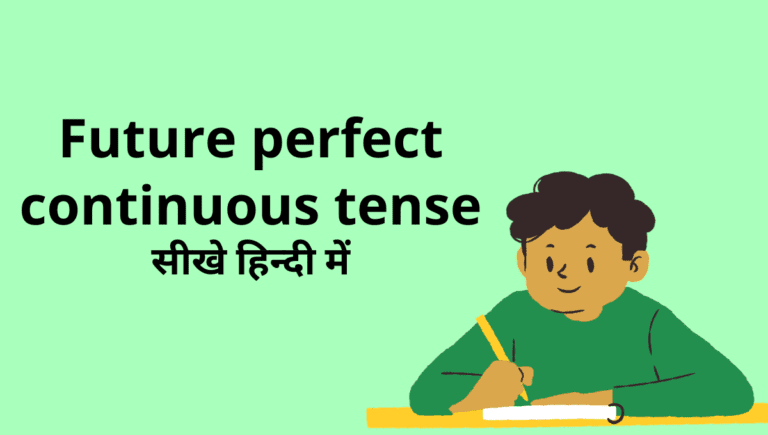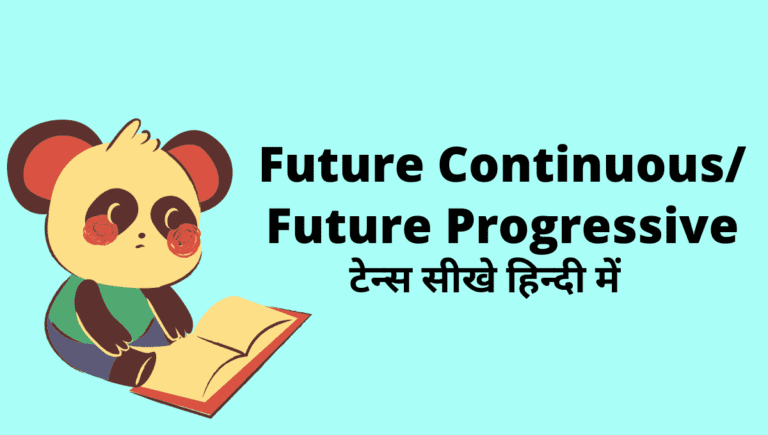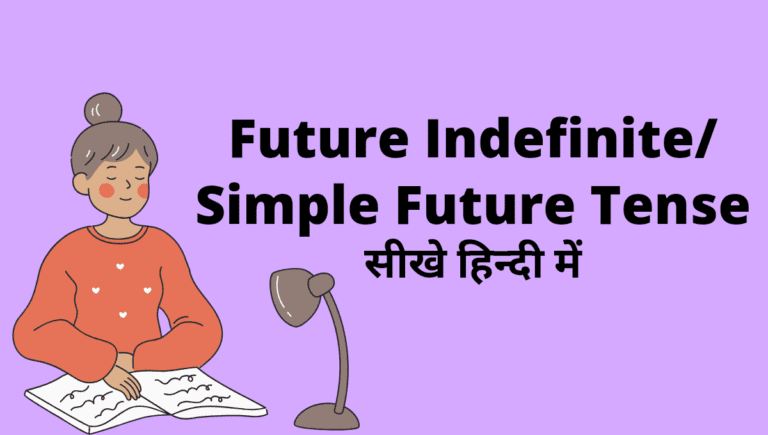इस पोस्ट फ्यूचर परफेक्ट टेंस (future perfect tense in Hindi) में हम future perfect tense को सीखेंगे। और साथ ही फ्यूचर परफेक्ट टेंस की परिभाषा (definition), पहचान, नियम (rules), सूत्र (formulas), और वाक्यों में उपयोग (future perfect tense sentences in hindi) भी सीखेंगे। इससे पहले हमने future continuous tense को सीखा था।
तो आइए इस पोस्ट (future perfect tense in Hindi) मे “फ्यूचर परफेक्ट टेंस” को आसान भाषा में समझते है। जिससे आपको कभी भी इस टेन्स मे कोई परेशानी ना हो।
Future perfect tense in Hindi
Future perfect tense (पूर्ण भविष्यकाल), future tense (भविष्यकाल) का तीसरा टेन्स है, जैसा की आप नीचे देख सकते है:
भविष्यकाल (future tense) के चार प्रकार –
- Future indefinite tense (अनिश्चित भविष्यकाल)
- Future continuous tense (अपूर्ण भविष्यकाल)
- Future perfect tense (पूर्ण भविष्यकाल)
- Future perfect continuous tense (पूर्ण-अपूर्ण भविष्यकाल)
Future perfect tense की परिभाषा
पूर्ण भविष्यकाल की परिभाषा – वह टेन्स जिसमें काम के भविष्य (आने वाले समय) में पूर्ण होने का पता चलता है। वहाँ future perfect tense (पूर्ण भविष्यकाल) होता है।
जैसे –
- उसने अपना राज़ अपने दोस्त को बता दिया होगा। (He will have told his secret to his friend.)
- हम अपनी परीक्षा में पास हो चुके होंगे। (We shall have passed our exam.)
ऊपर दिए गए वाक्यों से हमे पता चलता है की काम (क्रिया) भविष्य में पूरा हो गया होगा।
Future perfect tense meaning in Hindi
Future perfect tense का हिंदी अर्थ होता है- “पूर्ण भविष्यकाल”।
Future perfect tense की पहचान
जिन हिन्दी वाक्यों के अंत में चुका होगा, चुकी होगी, चुके होंगे, चुकूँगा, चूकेगा, चूकेगी, चूकेंगे आदि शब्द आते है, और काम के भविष्य में पूर्ण होने का पता चलता है। वहाँ future perfect tense होता है।
आसान शब्दों में कहे तो फ्यूचर परफेक्ट टेन्स में काम आने वाले समय में पूरा होता है। जैसे- “विक्रम कार खरीद चुका होगा।” इस वाक्य में, कार खरीदी जाएगी जो की आने वाले समय में पूरा होने वाला काम है।
Future perfect tense का उपयोग
फ्यूचर परफेक्ट टेन्स का उपयोग करते समय हमे निम्न बातों का ध्यान रखना चाहिए:
- इस टेन्स में verb की 3rd form का उपयोग किया जाता है।
- इस टेन्स में helping verb के रूप में will have और shall have का उपयोग होता है। और इनका उपयोग इस प्रकार किया जाता है-
Will have और shall have का प्रयोग –
- Shall have का प्रयोग first person (यानी I और we) के साथ किया जाता है।
- Will have का प्रयोग second person (यानी you) और third person (यानी he, she, it, name, they) के साथ किया जाता है।
Note: सामान्यत इस टेंस के सभी वाक्यों में will have का उपयोग किया जा सकता है, तो आप कन्फ्यूज ना हो।
Future perfect tense के formulas
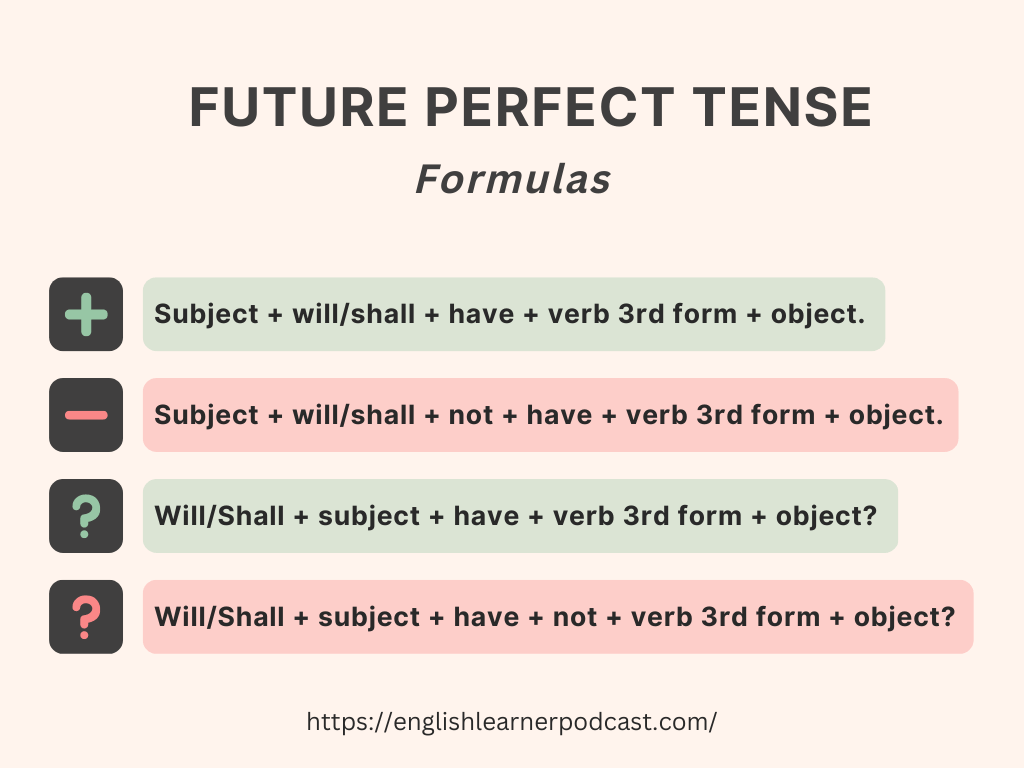
Subject + will/shall + have + verb 3rd form + object. (for positive sentence)
Subject + will/shall + not + have + verb 3rd form + object. (for negative sentence)
Will/Shall + subject + have + verb 3rd form + object? (for interrogative sentence)
Will/Shall + subject + have + not + verb 3rd form + object? (for interro-negative sentence)
{or}
Will/Shall + not + subject + have + verb 3rd form + object? (for interro-negative sentence)
Types of sentences in “Future perfect tense”
Future perfect tense के वाक्यों को चार भागों में बाँटा जा सकता है:
- Positive sentence (सकारात्मक वाक्य)
- Negative sentence (नकारात्मक वाक्य)
- Interrogative sentence (प्रश्नवाचक वाक्य)
- Negative Interrogative sentence (नकारात्मक प्रश्नवाचक वाक्य)
Positive sentence
Formula
Subject + will/shall + have + verb 3rd form + object.
Example in Hindi and English
1.) मैंने खाना खा लिया होगा।
1.) I shall have eaten food.
2.) माँ बाज़ार से सब्जियाँ ले आई होंगी।
2.) Mom will have brought vegetables from the market.
3.) बच्चे कल इस समय तक खाना खा चुके होंगे।
3.) The children will have eaten by this time tomorrow.
4.) शनिवार तक हम सब महाकाल जा चुके होंगे।
4.) By Saturday we all will have gone to Mahakal.
5.) वह मुझे भूल चुका होगा।
5.) He will have forgotten me.
ऊपर दिए गए वाक्यों में हमने will have/shall have के साथ verb की 3rd form का उपयोग किया है।
Negative sentence
Formula
Subject + will/shall + not + have + verb 3rd form + object.
Example in Hindi and English
1.) मैंने खाना नहीं खाया होगा।
1.) I shall not (shan’t) have eaten food.
2.) मां बाजार से सब्जियां नहीं लाई होंगी।
2.) Mom will not have brought vegetables from the market.
3.) बच्चे कल इस समय तक खाना नहीं खा चुके होंगे।
3.) The children will not have eaten by this time tomorrow.
4.) शनिवार तक हम सब महाकाल नहीं जा चुके होंगे।
4.) By Saturday we all will not have gone to Mahakal.
5.) वह मुझे भूल नहीं चुका होगा।
5.) He will not (won’t) have forgotten me.
ऊपर दिए गए वाक्यों में हमने will have/shall have और verb की 3rd form के साथ not का उपयोग किया है।
Note: Will not को शॉर्ट में won’t और shall not को shan’t कहते है।
Interrogative sentence
Formula
Will/Shall + subject + have + verb 3rd form + object?
Note- Interrogative sentence में हमेशा प्रश्नवाचक चिन्ह (?) लगता है।
Example in Hindi and English
1.) क्या मैंने खाना खाया होगा?
1.) Shall I have eaten food?
2.) क्या मां बाजार से सब्जियां लाई होंगी?
2.) Will the mother have brought vegetables from the market?
3.) क्या बच्चे कल इस समय तक खाना खा चुके होंगे?
3.) Will the children have eaten by this time tomorrow?
4.) क्या शनिवार तक हम सब महाकाल जा चुके होंगे?
4.) Will we all have gone to Mahakal by Saturday?
5.) क्या वह मुझे भूल गया होगा?
5.) Will he have forgotten me?
ऊपर दिए गए वाक्यों में हमने will have/shall have के साथ verb की 3rd form का प्रयोग किया है। और अंत में प्रश्नवाचक चिन्ह(?) लगाया है।
Negative interrogative sentence
Formula
Will/Shall + subject + have + not + verb 3rd form + object?
{or}
Will/Shall + not + subject + have + verb 3rd form + object?
Note-
- Negative interrogative sentence में हमेशा प्रश्नवाचक चिन्ह (?) लगता है।
- Negative interogative sentence को interro-negative sentense भी कहते है।
Example in Hindi and English
1.) क्या मैंने खाना नहीं खाया होगा?
1.) Shall I not have eaten food?
2.) क्या मां बाजार से सब्जियां नहीं लाई होंगी?
2.) Will the mother not have brought vegetables from the market?
3.) क्या बच्चे कल इस समय तक खाना नहीं खा चुके होंगे?
3.) Will the children not have eaten by this time tomorrow?
(or) Won’t the children have eaten by this time tomorrow?
4.) क्या शनिवार तक हम सब महाकाल नहीं जा चुके होंगे?
4.) Will we all not have gone to Mahakal by Saturday?
5.) क्या वह मुझे भूल नहीं गया होगा?
5.) Will he not have forgotten me?
(or) Won’t he have forgotten me?
ऊपर दिए गए वाक्यों में हमने will not have/shall not have के साथ verb की 3rd form का प्रयोग किया है। और अंत में प्रश्नवाचक चिन्ह(?) लगाया है।
Future perfect tense examples in Hindi
Future perfect tense को और भी अच्छे से समझने के लिए आप कुछ और फ्यूचर परफेक्ट टेंस के हिन्दी उदाहरण (future perfect tense examples in Hindi) नीचे देख सकते है:
1.) 7 बजे से पहले मैं उठ चुका होगा।
1.) I will/shall have got up before 7 o’clock.
2.) शाम तक वो ठीक हो चुकी होगी।
2.) She will have recovered by the evening.
3.) वे अपने कपड़े अपने दोस्त को नहीं दे चुके होंगे।
3.) They will not have given their clothes to their friend.
4.) क्या उसकी नौकरी लग गयी होगी?
4.) Will he have got the job?
5.) नवीन अपना इलाज करवा चुका होगा।
5.) Naveen will have got himself treated.
6.) क्या हम सब मतलबी नहीं बन चुके होंगे?
6.) Haven’t we all become selfish?
(or) Have we all not become selfish?
7.) हम एक दूसरे की मदद कर चुके होंगे।
7.) We will have helped each other.
8.) पापा घर पर पानी पूरी लेकर आ गये होगे।
8.) Papa will have brought pani puri home.
9.) मैं थक गया होऊंगा।
9.) I shall have been tired.
(or) I will have been tired.
10.) मेरे दोस्त मेरा जन्मदिन मना चुके होंगे।
10.) My friends will have celebrated my birthday.
Future perfect tense FAQs
Future tense (भविष्यकाल) चार प्रकार के होते है –
1.) Future indefinite tense(अनिश्चित भविष्यकाल)
2.) Future continuous tense (अपूर्ण भविष्यकाल)
3.) Future perfect tense (पूर्ण भविष्यकाल)
4.) Future perfect continuous tense (पूर्ण-अपूर्ण भविष्यकाल)
जिन हिन्दी वाक्यों के अंत में चुका होगा, चुकी होगी, चुके होंगे, चुकूँगा, चूकेगा, चूकेगी, चूकेंगे आदि शब्द आते है, और काम के भविष्य में पूर्ण होने का पता चलता है। वहाँ future perfect tense होता है।
फ्यूचर परफेक्ट टेन्स में हेल्पिंग वर्ब के रूप में will have और shall have का उपयोग किया जाता है।
और इनका उपयोग इस प्रकार किया जाता है-
Will have – He, she, it, name, you, they के साथ।
Shall have – I, we के साथ।
Conclusion
इस पोस्ट (future perfect tense in Hindi) में हमने future perfect tense के बारे में जाना। और साथ ही फ्यूचर परफेक्ट टेंस की परिभाषा (definition of future perfect tense) और उसके उपयोग (future perfect tense examples in hindi) सीखे।
हमें आशा है की आपको यह पोस्ट पसंद आयी होगी। आपको यह पोस्ट कैसी लगी हमें कमेन्ट मे जरूर बताए। अगर आपका इस पोस्ट (future perfect tense in Hindi) से संबंधित कोई सवाल या सुझाव हो तो आप हमें comment में बता सकते है।
इस तरह की और भी पोस्ट पढ़े –
Future Tense (भविष्यकाल)

